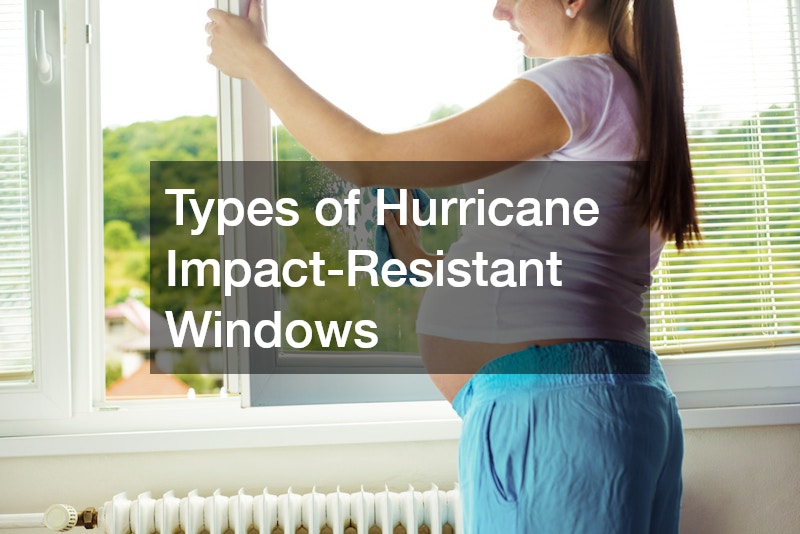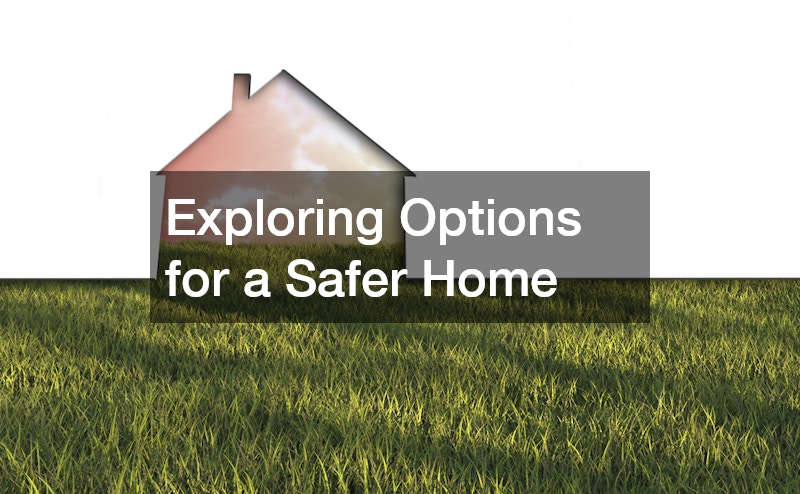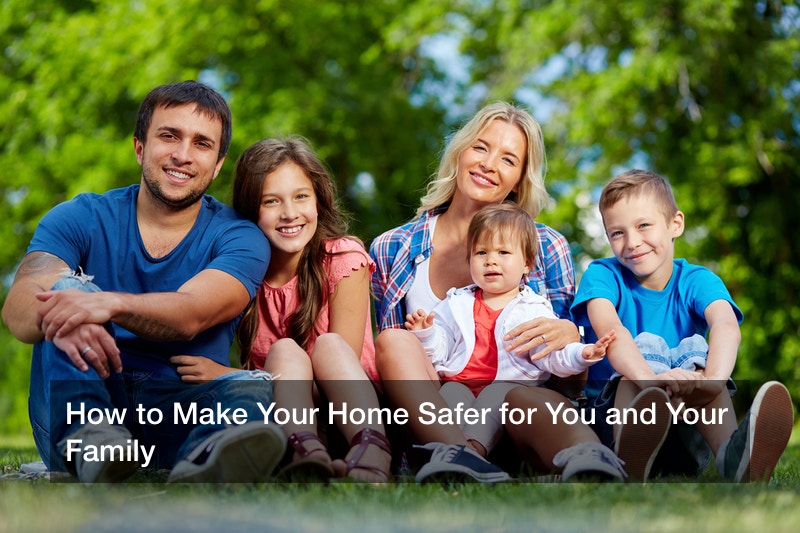
Did you know that every area of the U.S. can benefit from hurricane windows on homes? It’s true even though hurricanes typically affect the East Coast and the Gulf states. These strong windows protect from high winds, so they also work well on homes in Tornado Alley and in southern California, which experiences Santa Ana winds.

Types of Hurricane Impact-Resistant Windows
Every area of the country experiences high winds at some point, so using the best hurricane windows on your home provides a higher level of protection. So, what hurricane window protection options does your home have? If you peruse the options at your local building supply store, you’ll find hurricane windows referred to as impact-resistant windows. These windows come in five types, each made with a different type of glass:
• Monolithic glass
• Laminated glass
• Tempered glass
• Composite glass
• Multi-layered glass.
Monolithic glass, a single-pane design, offers essential protection, while multi-layered glass offers the greatest protection through its layers of tempered and laminated glass, protective film, and inert gases.

Understanding Window Ratings
Hurricane window ratings measure the design pressure (DP) of a window and express it in pounds per square foot (psf). The higher the DP, the higher the winds and water pressure it can withstand. Following Hurricane Andrew, the municipal government in Miami-Dade, Florida, amended its building code to require windows with a DP of 60 or higher, a rating capable of withstanding hurricane category 5 winds.
Exploring Options for a Safer Home
Have you ever wondered just what it takes to have a safe home? Whether you’ve just moved into a new house or you’re having second thoughts about an old one, when it comes to home renovations, you know that decorating is a lot more fun than setting up security measures. But break-ins take place somewhere every day, and it’s only a matter of time before your family and possessions become a target for someone.
However, the biggest dangers aren’t always from outside the home. Something as simple as a broken fire alarm or an unsecured gun cabinet can pose a significant risk to your family’s safety and wellbeing, especially if you have small children.
Not to worry, though: with a few carefully applied tips, you can easily have a safe home for yourself and your family. To learn some of the best ways to make your home safer and healthier for everyone living in it, keep reading.
Practice Pool Safety
Like most of the safety tips on this list, keeping your family safe around water involves two things: having physical security precautions in place, and teaching your children what they need to know to practice water safety on their own. After all, you won’t always be around to make sure your kids are safe — sooner or later they must know how to be safe on their own, and the sooner the better.
First of all, do you and your family know how to swim? Even if you don’t have a pool in your backyard and you don’t watch the calendar waiting for local pool openings, knowing how to swim isn’t just a matter of having fun. According to the Center for Disease Control, approximately 10 people drown every day in the United States, just because they don’t know how to swim.
If you were taught to swim at a young age and always took it for granted, you might be surprised to know that a large percentage of Americans can’t swim properly, and this puts them all at risk. But even if you’re a skilled swimmer, you shouldn’t assume that your children can all swim well enough to save themselves if they were to fall into a lake or river. Investing in swimming lessons for your family could turn out to be the best thing you ever did for them. Not only that, but having essential survival skills like swimming can boost a child’s confidence and sense of wellbeing.

Of course, anyone can have a pool accident and drown, even if they can swim. So you should continue to take reasonable precautions if you have a pool in your backyard. Keeping your pool securely fenced in, and making sure no one uses it when they’re alone, are important if you want to have a safe home.
Manage Firearms Wisely
This part will be a little controversial, but let’s face it: lots of American families have firearms in their home. And that’s not a bad thing in itself — after all, we have the Second Amendment for a reason, and some people reasonably feel that keeping a gun nearby is important for keeping themselves and their family safe.
However, gun ownership becomes a problem when gun owners aren’t well trained in using them effectively and safely. Too many people purchase firearms at their local gun store without ever learning how to use or secure them. Needless to say, if you don’t know for sure you can hit a target with a gun, chances are slim that you could actually protect yourself with one. And if you don’t teach your kids strict gun safety and keep your guns well out of their reach, having them around could result in a bigger tragedy than you had hoped to prevent.
With all that said, having one or two guns strategically placed in your home can help you keep your family safe, especially if you live in a rough neighborhood. But you must undergo some form of firearm training classes first, and it’s a good idea if everyone else in your family does, too. Your family deserves to have a safe home, so don’t let something intended to protect become a tool for serious harm out of misuse.
Install a Home Security System
In an article about how to have a safe home, installing a security system is obvious advice, but it’s worth noting anyway. You probably don’t need something as advanced as industrial LiDAR services, but using some kind of security system is essential, not only for catching burglars if they break-in, but also to deter them.
If your home is clearly protected by an industry-leading security service, it’s incredibly unlikely that anyone would try to break in. In fact, security systems are such effective crime deterrents that it’s common practice to use dummy cameras — literally fake security cameras — to make would-be robbers assume the area is under surveillance. Of course, the trick is only convincing if there’s nothing to give it away: putting a camera in a completely illogical position could do more harm than good. But as far as low-cost, low-effort safety measures are concerned, installing dummy cameras is a good place to start.

But the real thing is always to be preferred, especially if your neighborhood has a history of burglaries. If a full-fledged surveillance service is too costly for your budget, there are dozens of other ways to secure your home. For example, putting sensors on your doors and windows to alert you if someone comes in at night is a good way to make your home safer.
Whether you use a combination of dummy cameras and sensors or you go all-out with a state-of-the-art surveillance system, using some form of security in your home is essential to maximize your family’s safety.
Have a Fire Safety Strategy
Smoke and fire alarms are required by law in most places, and they’re so commonplace that we almost take them for granted. But having a working fire alarm is just the first step in practicing fire safety.
For example, although you most likely have smoke detectors throughout your house, do you for sure that they work? When was the last time you tested them? According to the U.S. Fire Administration, smoke alarms should be tested at least once each month, and batteries should be replaced at least once per year. If you can’t remember the last time you changed your smoke detectors’ batteries, let alone when you last tested them, that should be the first step you take to have a safe home.
Here’s another thing to think about: suppose it was the middle of the night and your fire alarm went off. Would you know what to do? More importantly, do your children know how to respond in the event of a fire? Chances are you haven’t thought about it enough to create a game plan for your family in the case of a house fire.
At the first opportunity, you should do some research and brainstorm a fire safety plan for your family. You’ll need a fire map for each of your family members to memorize. It’s not complicated: basically, a fire map simply states that in the event of a fire, everyone must go outside and meet at a designated spot. This way you’ll know for sure that everyone got out okay. As part of the fire map, everyone also needs to know where the nearest exit is, wherever they are in the house, and they must know that if a smoke detector goes off, they are to exit that way — not through the front door, unless that’s the nearest exit to them.
For an extra precaution, you might want to hire fire sprinkler contractors to set up an automatic sprinkler system in your house. This is especially wise if you have a large home with whole sections that could easily get engulfed in flames, restricting exit options.
Practice Auto Safety
Whether your children are old enough to drive or not, it’s never too early to start teaching them how to stay safe around cars and traffic.
From a very young age, you should start showing your children how to navigate streets and sidewalks safely. Tell them about the importance of wearing bright-colored outfits so they’re more visible to drivers. Teach them to find and use crosswalks when they need to cross a street, and to carefully look both ways before walking. Patients should be encouraged at all times, but especially when roads and traffic are involved.
If your children are approaching driving age, you can help them prepare for adulthood by involving them in trips to the gas station or automotive repair shop. While your kids will probably get driving lessons from their school, you should follow up with your own “curriculum” — or perhaps just a series of important questions — to make sure they know everything they need to stay safe on the road.

If your children are very small, you know how difficult it can sometimes be to keep track of them. Make sure you’re never backing out of your driveway while toddlers are outside, unless you know for sure there’s another adult nearby keeping watch. If your garage door doesn’t have a sensor to keep from closing when little people wander underneath it, you should contact your local garage door company to install one for you.
As with water and firearm safety, you need more than just to have a safe home. You need to instill in your children a sense of caution and responsibly when they’re near cars and traffic.
Stay on Top of Home Repairs
You might not expect to see basic home maintenance on a list of ways to have a safe home, but it’s more important than most might realize. Not only is it important to stay on top of repairs in order to protect your biggest investment, but letting things go can lead to real trouble for your family’s health and safety.
Water damage is perhaps the most obvious example of what can happen when you ignore basic home repairs. You should stay on the lookout for leaks in your roof, plumbing, and walls, as well as for excess water in the basement. If water is allowed to leak in and collect for a long time, it will create an atmosphere that mold and mildew thrive in. This can lead to allergy-like reactions in your family’s health, not to mention long-term structural damage to your home.
Pest control is another important part of home maintenance for your family’s health. Some pests spread diseases and cause illness, but even when they don’t, they’re still frustrating and dirty. You should make it a point to practice prevention whenever pests don’t seem to be a problem, rather than attacking them with harsh chemicals when they finally show up.
Problems involving electrical wiring are particularly important, as a faulty circuit or damaged wire can cause any number of bigger problems, from house fires to electrocution. Even things that seem insignificant, such as glass door repair, shouldn’t go ignored. An important part of having a safe and secure home is having a home that’s in good repair at all times. You never know when a single overlooked problem could cause ripple effects in unexpected ways.
Have a Family Lawyer on Call
Our last piece of advice has less to do with how to have a safe home, and more to do with protecting your family in general. As you might have realized by now, keeping your family safe involves a lot more than just securing the house you live in. Threats can come from all kinds of places, and the more unexpected they are, the more dangerous they tend to be.

If you’ve ever been in a work-related accident, you know how important it is to have a good personal injury attorney on your side. Likewise, you should have connections with a lawyer you can trust, even when you don’t expect to need one. Typically when you need a family attorney, it’s a little too late to shop around, or at best you’re in a hurry to find one. Having someone like an accident lawyer in your address book can be a great help in when you find yourself in a legal pinch.
Watch Out for Security Risks in the Future
At this point you may be feeling a little overwhelmed with ideas. But figuring out how to have a safe home doesn’t need to be a chore. Just use the tips in this article to get started, and relax: you don’t have to do everything at once, and every little step helps make your home safer and healthier for your family.
For now, identify the home safety strategies that are most important to you. Then create a plan that you’ll use to add in the others down the road. Most important of all, strive to be aware of potential security risks, and be prepared to take action when you see something that isn’t quite right. Exercising vigilance like this is the single best way to keep yourself and your loved ones safe and well.
And with that, you should know everything you need to get started on your mission to have a safe home.

